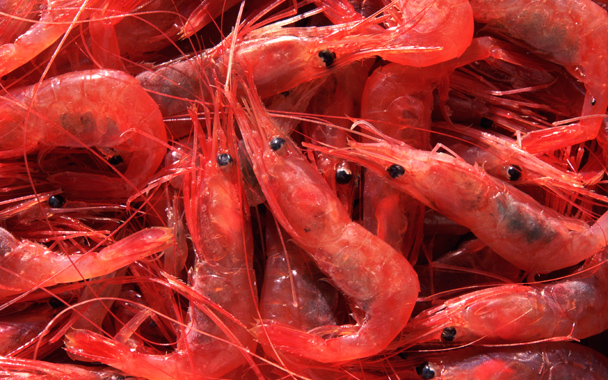Let Them Eat Shrimp
Enjoying a plate of shrimp and keeping a clean conscience just got a whole lot easier.
Last week, Oregon pink shrimp went on sale at more than 70 Wegmans Food Markets in New York, New Jersey, Pennsylvania, Maryland, and Virginia. In December, Oregon’s shrimp became the first of their kind to be certified as sustainable by the Marine Stewardship Council (MSC), whose strict requirements are considered the gold standard in marine conservation circles.
Unfortunately, unless you lived in the Pacific Northwest, getting your hands on the little fellows was a hit-and-miss (mostly miss) proposition. With the MSC’s blessing, that is changing. On the heels of Wegmans, Schnucks Markets Inc. and Super One Foods, Inc., who together operate about 130 stores in the Midwest and South, will soon start carrying Oregon pinks, according to the MSC.
Because of the difficulty in obtaining the tiny crustaceans, Gourmet has avoided using them in the recipes we publish. Now that there’s a better chance of encountering them in a local grocery store, Food Editor/Stylist Paul Grimes plans to try substituting Oregon pinks for lobster in his Mini Lobster Rolls, irresistible, appetizer-sized bites that can be put together in 20 minutes.
Pair them with organic beer, and invite friends over one of these fine spring evenings for cocktails with a clean conscience.
Strange Bedfellows
The Center for Science in the Public Interest’s executive director, Michael F. Jacobson has always struck me as one of the more uncompromising of Washington, D. C.’s, consumer health advocates. So I was shocked last month to find that he had joined forces with the Corn Refiners Association in opposition to a proposal by San Francisco Mayor Gavin Newsom to tax soft drinks and other beverages sweetened with high-fructose corn syrup (HFCS), which has been singled out as one of the main culprits in the country’s obesity epidemic.
Jacobson outlined his objections in a letter to the mayor, claiming that scientific evidence “demonstrates no material difference in the health effects of high-fructose corn syrup and sugar.” He calls the notion that corn syrup is worse for us “an urban myth.”
I respectfully disagree. True, a calorie of sugar is a calorie of sugar, whether it originates from a maple tree, a beehive, or a kernel of corn. But as Michael Pollan so eloquently pointed out in his book The Omnivore’s Dilemma, the current obesity crisis dates back to 1980, the year that HFCS first entered our food system. Starting from zero, we now gulp down an average of 66 pounds of the stuff annually, mostly in soft drinks. As Pollan points out, the low cost of HFCS allowed companies to drop the prices on carbonated beverages at the same time as they increased the size of bottles. And we obligingly guzzled more.
Taxes, by way of commodity grants to the farmers that grow all that cheap corn, got us into the problem, so it seems eminently fair that taxes should help us find our way out.




 Pinterest
Pinterest


